前言
针对不同平台/语言下的命令执行是不相同的,存在很大的差异性。因此,这里对不同平台/语言下的命令执行函数进行深入的探究分析。
文章开头会对不同平台(Linux、Windows)下:终端的指令执行、语言(PHP、Java、Python)的命令执行进行介绍分析。后面,主要以PHP语言为对象,针对不同平台,对命令执行函数进行底层深入分析,这个过程包括:环境准备、PHP内核源码的编译、运行、调试、审计等,其它语言分析原理思路类似。
该系列分析文章主要分为四部分,如下:
- 第一部分:命令执行底层原理探究-PHP (一)
针对不同平台(Linux、Windows)下:终端的指令执行、语言(PHP、Java、Python)的命令执行进行介绍分析。
- 第二部分:命令执行底层原理探究-PHP (二)
主要以PHP语言为对象,针对不同平台,进行环境准备、PHP内核源码的编译、运行、调试等。
- 第三部分:命令执行底层原理探究-PHP (三)
针对Windows平台下,PHP命令执行函数的底层原理分析。
- 第四部分:命令执行底层原理探究-PHP (四)
针对Linux平台下,PHP命令执行函数的底层原理分析。
本文《 命令执行底层原理探究-PHP (三) 》主要讲述的是第三部分:针对Windows平台下,PHP命令执行函数的底层原理分析。
PHP for Windows
针对Windows平台下:PHP命令执行函数的底层分析。
命令执行底层分析
针对命令执行函数的底层分析,这里主要采用两种手段去分析:静态审计(静态审计内核源码)、动态审计(动态调试内核源码)。
静态审计
PHP命令执行函数有很多
system
exec
passthru
shell_exec
proc_open
popen
pcntl_exec
escapeshellarg
escapeshellcmd
、、、、
大部分命令执行函数于ext/standard/exec.c源码中实现
/* {{{ proto string exec(string command [, array &output [, int &return_value]])
Execute an external program */
PHP_FUNCTION(exec)
{
php_exec_ex(INTERNAL_FUNCTION_PARAM_PASSTHRU, 0);
}
/* }}} */
/* {{{ proto int system(string command [, int &return_value])
Execute an external program and display output */
PHP_FUNCTION(system)
{
php_exec_ex(INTERNAL_FUNCTION_PARAM_PASSTHRU, 1);
}
/* }}} */
/* {{{ proto void passthru(string command [, int &return_value])
Execute an external program and display raw output */
PHP_FUNCTION(passthru)
{
php_exec_ex(INTERNAL_FUNCTION_PARAM_PASSTHRU, 3);
}
/* }}} */
/* {{{ proto string shell_exec(string cmd)
Execute command via shell and return complete output as string */
PHP_FUNCTION(shell_exec)
{
FILE *in;
char *command;
size_t command_len;
zend_string *ret;
php_stream *stream;
ZEND_PARSE_PARAMETERS_START(1, 1)
Z_PARAM_STRING(command, command_len)
ZEND_PARSE_PARAMETERS_END();
#ifdef PHP_WIN32
if ((in=VCWD_POPEN(command, "rt"))==NULL) {
#else
if ((in=VCWD_POPEN(command, "r"))==NULL) {
#endif
php_error_docref(NULL, E_WARNING, "Unable to execute '%s'", command);
RETURN_FALSE;
}
stream = php_stream_fopen_from_pipe(in, "rb");
ret = php_stream_copy_to_mem(stream, PHP_STREAM_COPY_ALL, 0);
php_stream_close(stream);
if (ret && ZSTR_LEN(ret) > 0) {
RETVAL_STR(ret);
}
}
/* }}} */
观察上面代码部分,可以发现system、exec、passthru这三个命令执行函数调用函数一样,皆为php_exec_ex()函数,不同点只在于调用函数的第二个参数mode不同0、1、3作为标识。而shell_exec函数则是调用VCWD_POPEN()函数去实现。
下面以system()命令执行函数执行whoami指令为例:
system('whoami');
借助源码审查工具Source Insight【导入php7.2.9源码项目】进行底层函数跟踪分析
首先找到php中system()函数声明处:ext\standard\exec.c:263
PHP_FUNCTION(system)
{
php_exec_ex(INTERNAL_FUNCTION_PARAM_PASSTHRU, 1);
}
很明显system函数由php_exec_ex()函数实现,跟进同文件下找到php_exec_ex()函数实现【在Source Insight下面可以使用Ctrl+鼠标左键点击定位函数位置】:ext\standard\exec.c:209
static void php_exec_ex(INTERNAL_FUNCTION_PARAMETERS, int mode) /* {{{ */
{
char *cmd;
size_t cmd_len;
zval *ret_code=NULL, *ret_array=NULL;
int ret;
ZEND_PARSE_PARAMETERS_START(1, (mode ? 2 : 3))
Z_PARAM_STRING(cmd, cmd_len)
Z_PARAM_OPTIONAL
if (!mode) {
Z_PARAM_ZVAL_DEREF(ret_array)
}
Z_PARAM_ZVAL_DEREF(ret_code)
ZEND_PARSE_PARAMETERS_END_EX(RETURN_FALSE);
if (!cmd_len) {
php_error_docref(NULL, E_WARNING, "Cannot execute a blank command");
RETURN_FALSE;
}
if (strlen(cmd) != cmd_len) {
php_error_docref(NULL, E_WARNING, "NULL byte detected. Possible attack");
RETURN_FALSE;
}
if (!ret_array) {
ret = php_exec(mode, cmd, NULL, return_value);
} else {
if (Z_TYPE_P(ret_array) != IS_ARRAY) {
zval_ptr_dtor(ret_array);
array_init(ret_array);
} else if (Z_REFCOUNT_P(ret_array) > 1) {
zval_ptr_dtor(ret_array);
ZVAL_ARR(ret_array, zend_array_dup(Z_ARR_P(ret_array)));
}
ret = php_exec(2, cmd, ret_array, return_value);
}
if (ret_code) {
zval_ptr_dtor(ret_code);
ZVAL_LONG(ret_code, ret);
}
}
/* }}} */
阅读php_exec_ex()函数实现,会对cmd参数进行初始化处理,然后调用php_exec(mode, cmd, NULL, return_value)函数,mode为不同执行函数标识、cmd为指令参数。
跟踪php_exec()函数调用:ext\standard\exec.c:97
/* {{{ php_exec
* If type==0, only last line of output is returned (exec)
* If type==1, all lines will be printed and last lined returned (system)
* If type==2, all lines will be saved to given array (exec with &$array)
* If type==3, output will be printed binary, no lines will be saved or returned (passthru)
*
*/
PHPAPI int php_exec(int type, char *cmd, zval *array, zval *return_value)
{
FILE *fp;
char *buf;
size_t l = 0;
int pclose_return;
char *b, *d=NULL;
php_stream *stream;
size_t buflen, bufl = 0;
#if PHP_SIGCHILD
void (*sig_handler)() = NULL;
#endif
#if PHP_SIGCHILD
sig_handler = signal (SIGCHLD, SIG_DFL);
#endif
#ifdef PHP_WIN32
fp = VCWD_POPEN(cmd, "rb");
#else
fp = VCWD_POPEN(cmd, "r");
#endif
if (!fp) {
php_error_docref(NULL, E_WARNING, "Unable to fork [%s]", cmd);
goto err;
}
stream = php_stream_fopen_from_pipe(fp, "rb");
buf = (char *) emalloc(EXEC_INPUT_BUF);
buflen = EXEC_INPUT_BUF;
if (type != 3) {
b = buf;
while (php_stream_get_line(stream, b, EXEC_INPUT_BUF, &bufl)) {
/* no new line found, let's read some more */
if (b[bufl - 1] != '\n' && !php_stream_eof(stream)) {
if (buflen < (bufl + (b - buf) + EXEC_INPUT_BUF)) {
bufl += b - buf;
buflen = bufl + EXEC_INPUT_BUF;
buf = erealloc(buf, buflen);
b = buf + bufl;
} else {
b += bufl;
}
continue;
} else if (b != buf) {
bufl += b - buf;
}
if (type == 1) {
PHPWRITE(buf, bufl);
if (php_output_get_level() < 1) {
sapi_flush();
}
} else if (type == 2) {
/* strip trailing whitespaces */
l = bufl;
while (l-- > 0 && isspace(((unsigned char *)buf)[l]));
if (l != (bufl - 1)) {
bufl = l + 1;
buf[bufl] = '\0';
}
add_next_index_stringl(array, buf, bufl);
}
b = buf;
}
if (bufl) {
/* strip trailing whitespaces if we have not done so already */
if ((type == 2 && buf != b) || type != 2) {
l = bufl;
while (l-- > 0 && isspace(((unsigned char *)buf)[l]));
if (l != (bufl - 1)) {
bufl = l + 1;
buf[bufl] = '\0';
}
if (type == 2) {
add_next_index_stringl(array, buf, bufl);
}
}
/* Return last line from the shell command */
RETVAL_STRINGL(buf, bufl);
} else { /* should return NULL, but for BC we return "" */
RETVAL_EMPTY_STRING();
}
} else {
while((bufl = php_stream_read(stream, buf, EXEC_INPUT_BUF)) > 0) {
PHPWRITE(buf, bufl);
}
}
pclose_return = php_stream_close(stream);
efree(buf);
done:
#if PHP_SIGCHILD
if (sig_handler) {
signal(SIGCHLD, sig_handler);
}
#endif
if (d) {
efree(d);
}
return pclose_return;
err:
pclose_return = -1;
goto done;
}
/* }}} */
审计int php_exec(int type, char *cmd, zval *array, zval *return_value)函数代码,发现函数内部会首先调用VCWD_POPEN()函数去处理cmd指令【在这里不难发现该部分函数VCWD_POPEN()调用同shell_exec()可执行函数实现原理相同,也就说明system、exec、passthru、shell_exec这类命令执行函数原理相同,底层都调用了相同函数VCWD_POPEN()去执行系统指令】。
这里的VCWD_POPEN()函数调用会通过相应的平台去执行:PHP_WIN32为Windows平台、另一个为Unix平台
#ifdef PHP_WIN32
fp = VCWD_POPEN(cmd, "rb");
#else
fp = VCWD_POPEN(cmd, "r");
#endif
进入VCWD_POPEN(cmd, "rb")函数: Zend\zend_virtual_cwd.h:269
#define VCWD_POPEN(command, type) virtual_popen(command, type)
由于VCWD_POPEN函数为virtual_popen实现,直接进入virtual_popen()函数实现:Zend\zend_virtual_cwd.c:1831
#ifdef ZEND_WIN32
CWD_API FILE *virtual_popen(const char *command, const char *type) /* {{{ */
{
return popen_ex(command, type, CWDG(cwd).cwd, NULL);
}
/* }}} */
#else /* Unix */
CWD_API FILE *virtual_popen(const char *command, const char *type) /* {{{ */
{
size_t command_length;
int dir_length, extra = 0;
char *command_line;
char *ptr, *dir;
FILE *retval;
command_length = strlen(command);
dir_length = CWDG(cwd).cwd_length;
dir = CWDG(cwd).cwd;
while (dir_length > 0) {
if (*dir == '\'') extra+=3;
dir++;
dir_length--;
}
dir_length = CWDG(cwd).cwd_length;
dir = CWDG(cwd).cwd;
ptr = command_line = (char *) emalloc(command_length + sizeof("cd '' ; ") + dir_length + extra+1+1);
memcpy(ptr, "cd ", sizeof("cd ")-1);
ptr += sizeof("cd ")-1;
if (CWDG(cwd).cwd_length == 0) {
*ptr++ = DEFAULT_SLASH;
} else {
*ptr++ = '\'';
while (dir_length > 0) {
switch (*dir) {
case '\'':
*ptr++ = '\'';
*ptr++ = '\\';
*ptr++ = '\'';
/* fall-through */
default:
*ptr++ = *dir;
}
dir++;
dir_length--;
}
*ptr++ = '\'';
}
*ptr++ = ' ';
*ptr++ = ';';
*ptr++ = ' ';
memcpy(ptr, command, command_length+1);
retval = popen(command_line, type);
efree(command_line);
return retval;
}
/* }}} */
#endif
不难发现,针对virtual_popen()函数实现,也存在于不同平台,这里主要分析Windows平台,针对Unix平台在下面PHP for Linux部分会详细讲述。
针对Windows平台,virtual_popen()函数实现非常简单,直接调用popen_ex()函数进行返回。
进入popen_ex()函数实现:TSRM\tsrm_win32.c:473
TSRM_API FILE *popen_ex(const char *command, const char *type, const char *cwd, char *env)
{/*{{{*/
FILE *stream = NULL;
int fno, type_len, read, mode;
STARTUPINFOW startup;
PROCESS_INFORMATION process;
SECURITY_ATTRIBUTES security;
HANDLE in, out;
DWORD dwCreateFlags = 0;
BOOL res;
process_pair *proc;
char *cmd = NULL;
wchar_t *cmdw = NULL, *cwdw = NULL, *envw = NULL;
int i;
char *ptype = (char *)type;
HANDLE thread_token = NULL;
HANDLE token_user = NULL;
BOOL asuser = TRUE;
if (!type) {
return NULL;
}
/*The following two checks can be removed once we drop XP support */
type_len = (int)strlen(type);
if (type_len <1 || type_len > 2) {
return NULL;
}
for (i=0; i < type_len; i++) {
if (!(*ptype == 'r' || *ptype == 'w' || *ptype == 'b' || *ptype == 't')) {
return NULL;
}
ptype++;
}
cmd = (char*)malloc(strlen(command)+strlen(TWG(comspec))+sizeof(" /c ")+2);
if (!cmd) {
return NULL;
}
sprintf(cmd, "%s /c \"%s\"", TWG(comspec), command);
cmdw = php_win32_cp_any_to_w(cmd);
if (!cmdw) {
free(cmd);
return NULL;
}
if (cwd) {
cwdw = php_win32_ioutil_any_to_w(cwd);
if (!cwdw) {
free(cmd);
free(cmdw);
return NULL;
}
}
security.nLength = sizeof(SECURITY_ATTRIBUTES);
security.bInheritHandle = TRUE;
security.lpSecurityDescriptor = NULL;
if (!type_len || !CreatePipe(&in, &out, &security, 2048L)) {
free(cmdw);
free(cwdw);
free(cmd);
return NULL;
}
memset(&startup, 0, sizeof(STARTUPINFOW));
memset(&process, 0, sizeof(PROCESS_INFORMATION));
startup.cb = sizeof(STARTUPINFOW);
startup.dwFlags = STARTF_USESTDHANDLES;
startup.hStdError = GetStdHandle(STD_ERROR_HANDLE);
read = (type[0] == 'r') ? TRUE : FALSE;
mode = ((type_len == 2) && (type[1] == 'b')) ? O_BINARY : O_TEXT;
if (read) {
in = dupHandle(in, FALSE);
startup.hStdInput = GetStdHandle(STD_INPUT_HANDLE);
startup.hStdOutput = out;
} else {
out = dupHandle(out, FALSE);
startup.hStdInput = in;
startup.hStdOutput = GetStdHandle(STD_OUTPUT_HANDLE);
}
dwCreateFlags = NORMAL_PRIORITY_CLASS;
if (strcmp(sapi_module.name, "cli") != 0) {
dwCreateFlags |= CREATE_NO_WINDOW;
}
/* Get a token with the impersonated user. */
if(OpenThreadToken(GetCurrentThread(), TOKEN_ALL_ACCESS, TRUE, &thread_token)) {
DuplicateTokenEx(thread_token, MAXIMUM_ALLOWED, &security, SecurityImpersonation, TokenPrimary, &token_user);
} else {
DWORD err = GetLastError();
if (err == ERROR_NO_TOKEN) {
asuser = FALSE;
}
}
envw = php_win32_cp_env_any_to_w(env);
if (envw) {
dwCreateFlags |= CREATE_UNICODE_ENVIRONMENT;
} else {
if (env) {
free(cmd);
free(cmdw);
free(cwdw);
return NULL;
}
}
if (asuser) {
res = CreateProcessAsUserW(token_user, NULL, cmdw, &security, &security, security.bInheritHandle, dwCreateFlags, envw, cwdw, &startup, &process);
CloseHandle(token_user);
} else {
res = CreateProcessW(NULL, cmdw, &security, &security, security.bInheritHandle, dwCreateFlags, envw, cwdw, &startup, &process);
}
free(cmd);
free(cmdw);
free(cwdw);
free(envw);
if (!res) {
return NULL;
}
CloseHandle(process.hThread);
proc = process_get(NULL);
if (read) {
fno = _open_osfhandle((tsrm_intptr_t)in, _O_RDONLY | mode);
CloseHandle(out);
} else {
fno = _open_osfhandle((tsrm_intptr_t)out, _O_WRONLY | mode);
CloseHandle(in);
}
stream = _fdopen(fno, type);
proc->prochnd = process.hProcess;
proc->stream = stream;
return stream;
}/*}}}*/
从TSRM\tsrm_win32.c文件不难发现,由virtual_popen()函数不同平台到popen_ex()函数可知,virtual_popen()函数是作为不同平台的分割点,此时的调用链已经到了仅和windows平台有联系。
接着对*popen_ex()函数进行分析,参数:command为指令参数、cwd为当前工作目录、env为环境变量信息。
为cmd变量动态分配空间:这里不得不说把cmd变量的空间分配的刚刚好
cmd = (char*)malloc(strlen(command)+strlen(TWG(comspec))+sizeof(" /c ")+2);
分配空间后,为cmd变量赋值
sprintf(cmd, "%s /c \"%s\"", TWG(comspec), command);
=> cmd = "cmd.exe /c whoami"
这部分其实在PHP官方手册的可执行函数中也有说明
到这里也就会发现system、exec、passthru、shell_exec这类命令执行函数底层都会调用系统终端cmd.exe来执行传入的指令参数。那么既然会调用系统cmd,就要将cmd进程启动起来。
继续向后分析*popen_ex()函数,会找到相关Windows系统API来启动cmd.exe进程,然后由cmd进程执行指令参数(内部|外部指令)。
if (asuser) {
res = CreateProcessAsUserW(token_user, NULL, cmdw, &security, &security, security.bInheritHandle, dwCreateFlags, envw, cwdw, &startup, &process);
CloseHandle(token_user);
} else {
res = CreateProcessW(NULL, cmdw, &security, &security, security.bInheritHandle, dwCreateFlags, envw, cwdw, &startup, &process);
}
在 Windows 平台上,创建进程有
WinExec,system,_spawn/_wspawn,CreateProcess,ShellExecute等多种途径,但上述函数基本上还是由CreateProcess Family封装的。在 Windows 使用C/C++创建进程应当优先使用CreateProcess,CreateProcess有三个变体,主要是为了支持以其他权限启动进程,CreateProcess及其变体如下:
| Function | Feature | Details |
|---|---|---|
| CreateProcessW/A | 创建常规进程,权限继承父进程权限 | |
| CreateProcessAsUserW/A | 使用主 Token 创建进程,子进程权限与 Token 限定一致 | 必须开启 SE_INCREASE_QUOTA_NAME
|
| CreateProcessWithTokenW | 使用主 Token 创建进程,子进程权限与 Token 限定一致 | 必须开启 SE_IMPERSONATE_NAME
|
| CreateProcessWithLogonW/A | 使用指定用户凭据启动进程 |
PS:有关Windows系统API的调用情况,一般编程语言启动某个可执行程序的进程,都会调用CreateProcessW系统API,而不使用CreateProcessAsUserW系统API。同时在cmd终端进程下,启动外部指令程序所调用的系统API一般为CreateProcessInternalW。
接着将进程运行的结果信息以流的形式返回,最终完成PHP命令执行函数的整个调用过程。
if (read) {
fno = _open_osfhandle((tsrm_intptr_t)in, _O_RDONLY | mode);
CloseHandle(out);
} else {
fno = _open_osfhandle((tsrm_intptr_t)out, _O_WRONLY | mode);
CloseHandle(in);
}
stream = _fdopen(fno, type);
proc->prochnd = process.hProcess;
proc->stream = stream;
return stream;
同理,按照上述整个审计思路,可整理出PHP常见命令执行函数在Windows平台下的底层调用链
动态审计
有了上面静态审计部分的分析,后续进行动态调试会很方便。这里同样以system()函数执行whoami指令为例来进行动态调试,其它函数调试原理类似。
// test.php
<?php
system("whoami");
?>
在ext/standard/exec.c:265中对system()函数实现入口处下断点,F5启动调试,运行至断点处
F11步入函数php_exec_ex(INTERNAL_FUNCTION_PARAM_PASSTHRU, 1)内部:ext\standard\exec.c:209
php_exec_ex()对cmd参数初始化处理后调用php_exec(mode, cmd, NULL, return_value)函数
F11步入php_exec()函数:ext\standard\exec.c:97,php_exec()函数会传入cmd指令调用VCWD_POPEN()函数
F11步入VCWD_POPEN()函数实现:
#define VCWD_POPEN(command, type) virtual_popen(command, type)
Zend\zend_virtual_cwd.h:269
由于VCWD_POPEN函数为virtual_popen实现,直接进入virtual_popen()函数实现:Zend\zend_virtual_cwd.c:1831
virtual_popen()函数将cmd指令、当前工作空间等参数传给popen_ex(command, type, CWDG(cwd).cwd, NULL)函数执行返回。
F11步入popen_ex()函数实现:TSRM\tsrm_win32.c:473
跟进popen_ex()函数,对cmd进行动态分配空间及赋值
从cmd赋值的结果上来看,命令执行函数执行命令由底层调用cmd.exe来执行相应系统指令(内部|外部)。
后续调用CreateProcessW()系统API来启动cmd.exe进程,执行相应的指令即可。
查看函数之间的调用栈
如果单纯的是想知道某个命令执行函数是否调用cmd.exe终端去执行系统指令的话,可以在php脚本里面写一个循环,然后观察进程创建情况即可:简单、粗暴。


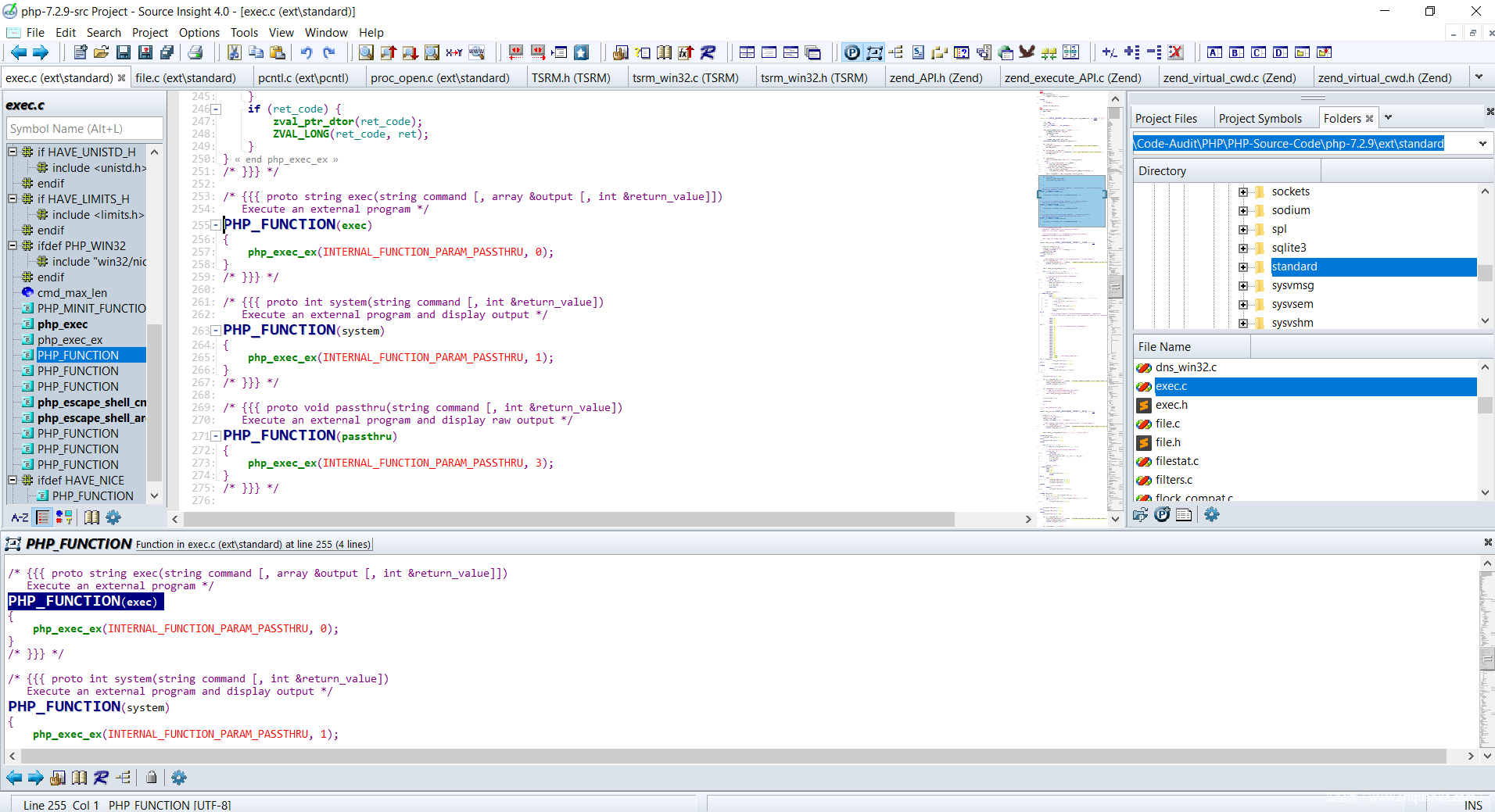
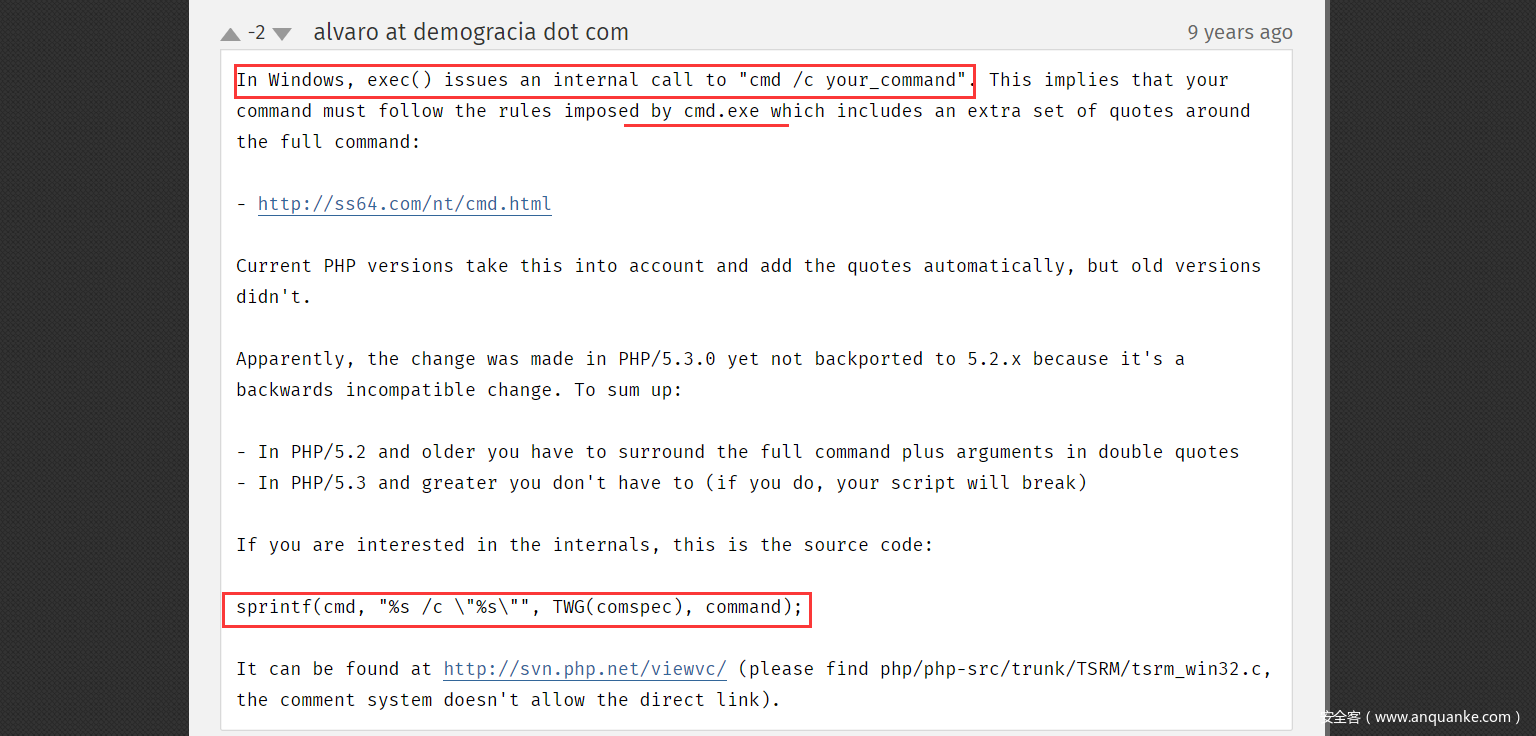
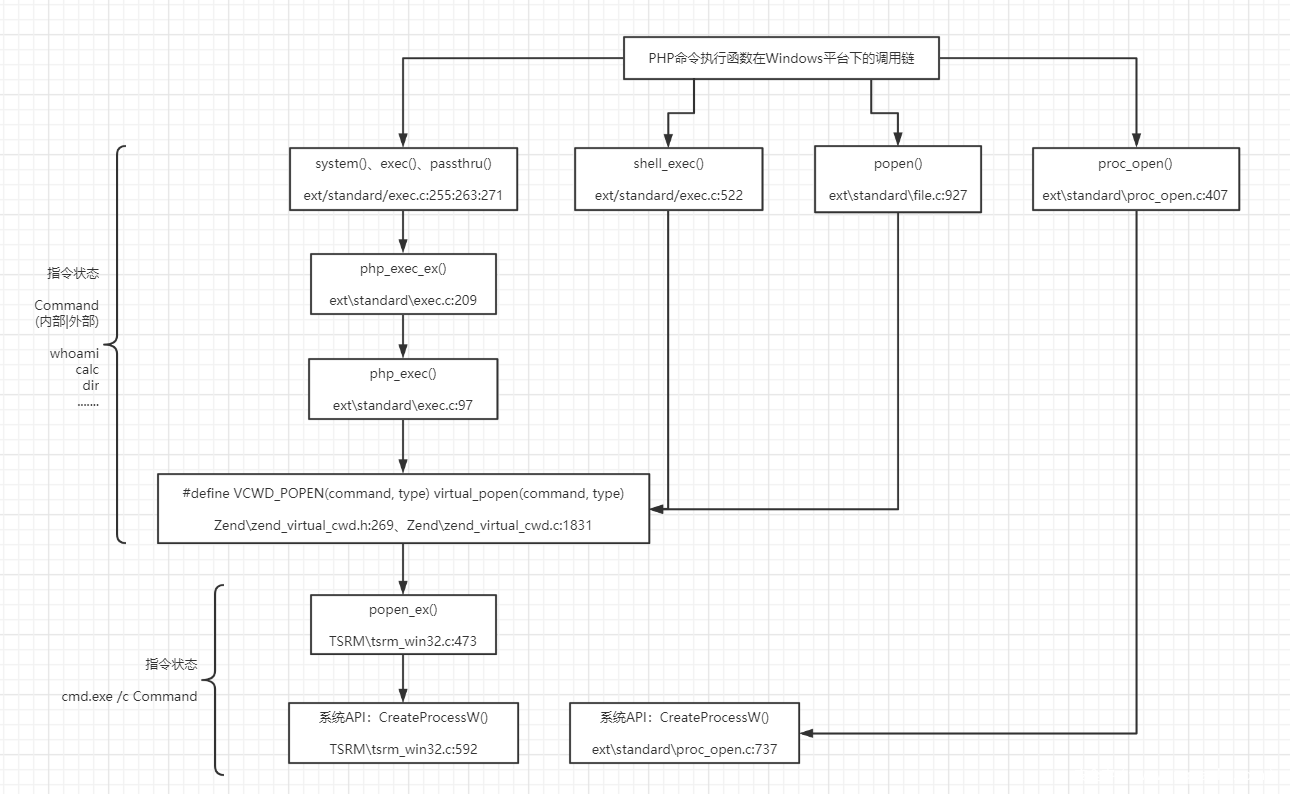
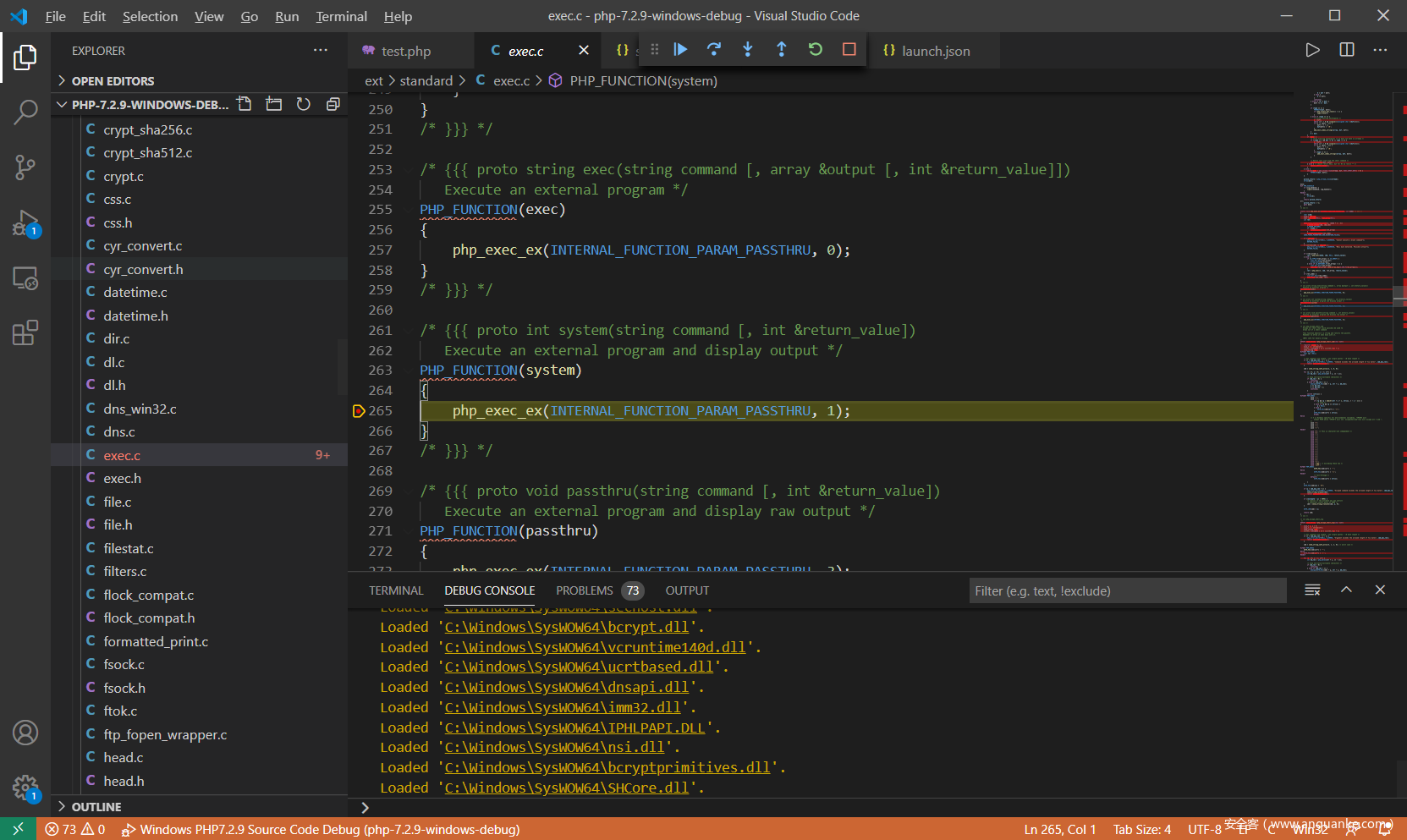
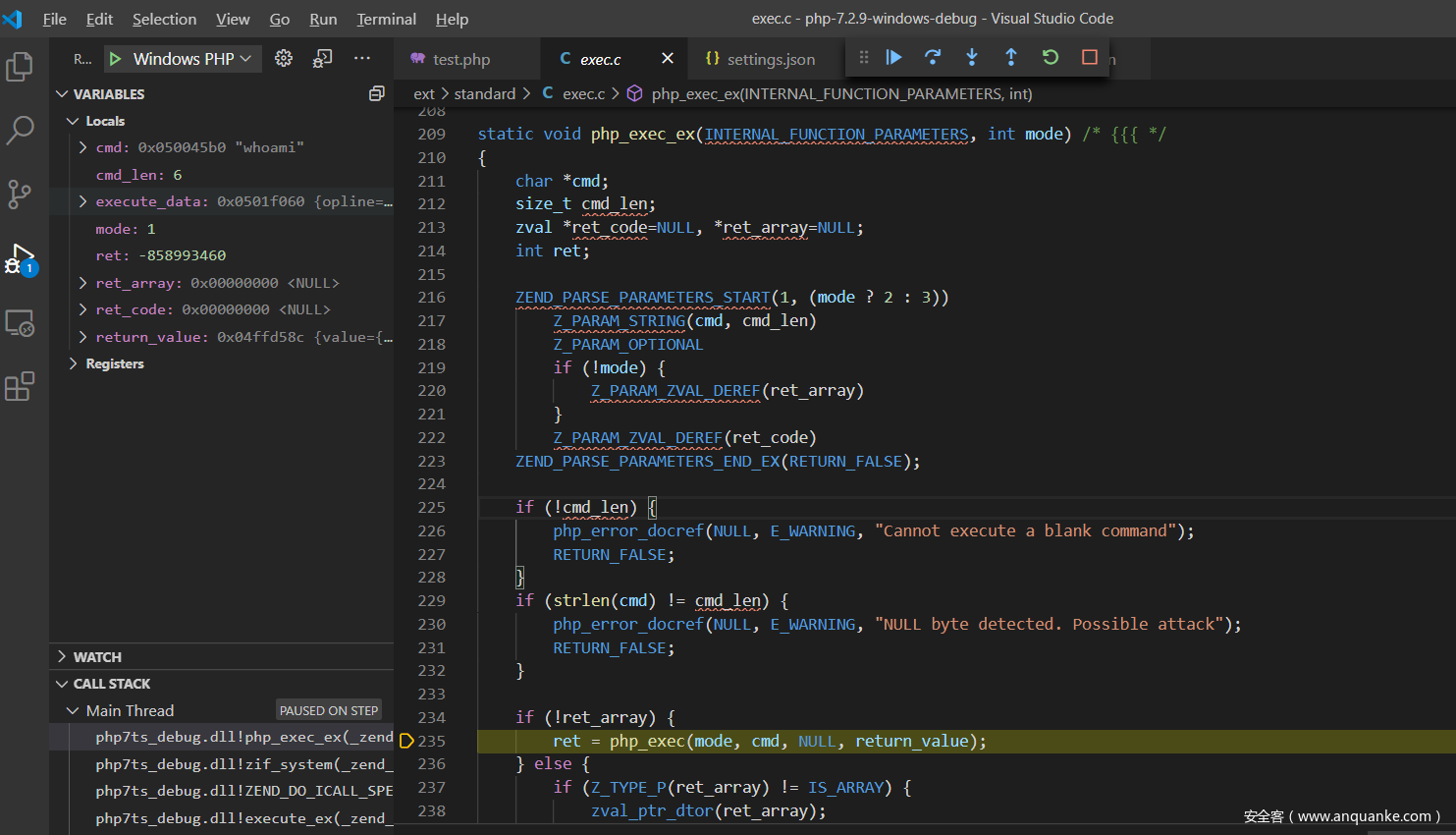
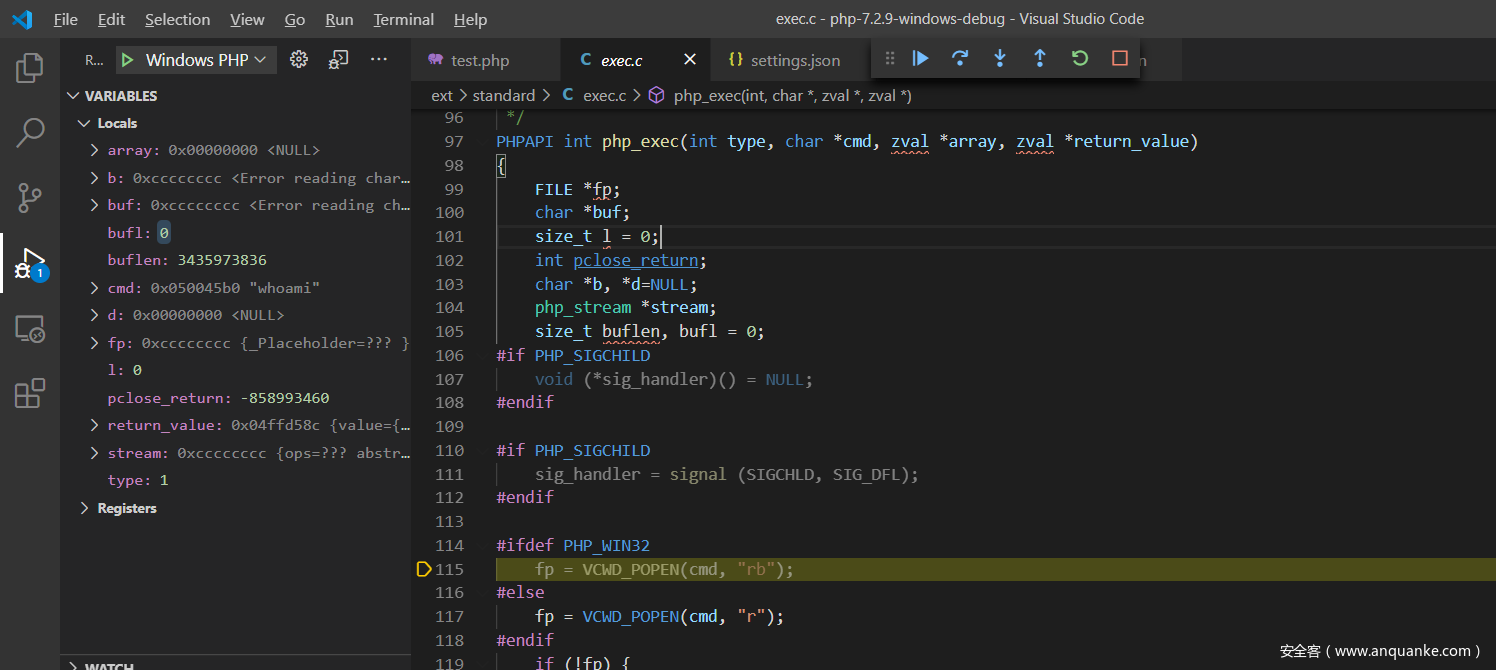
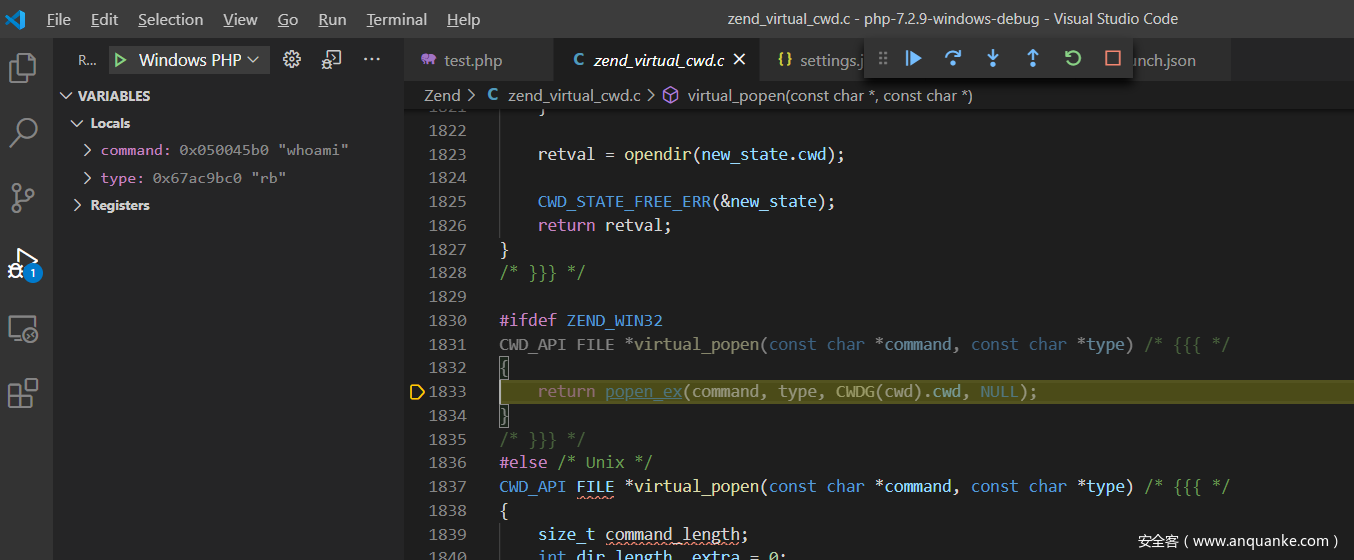
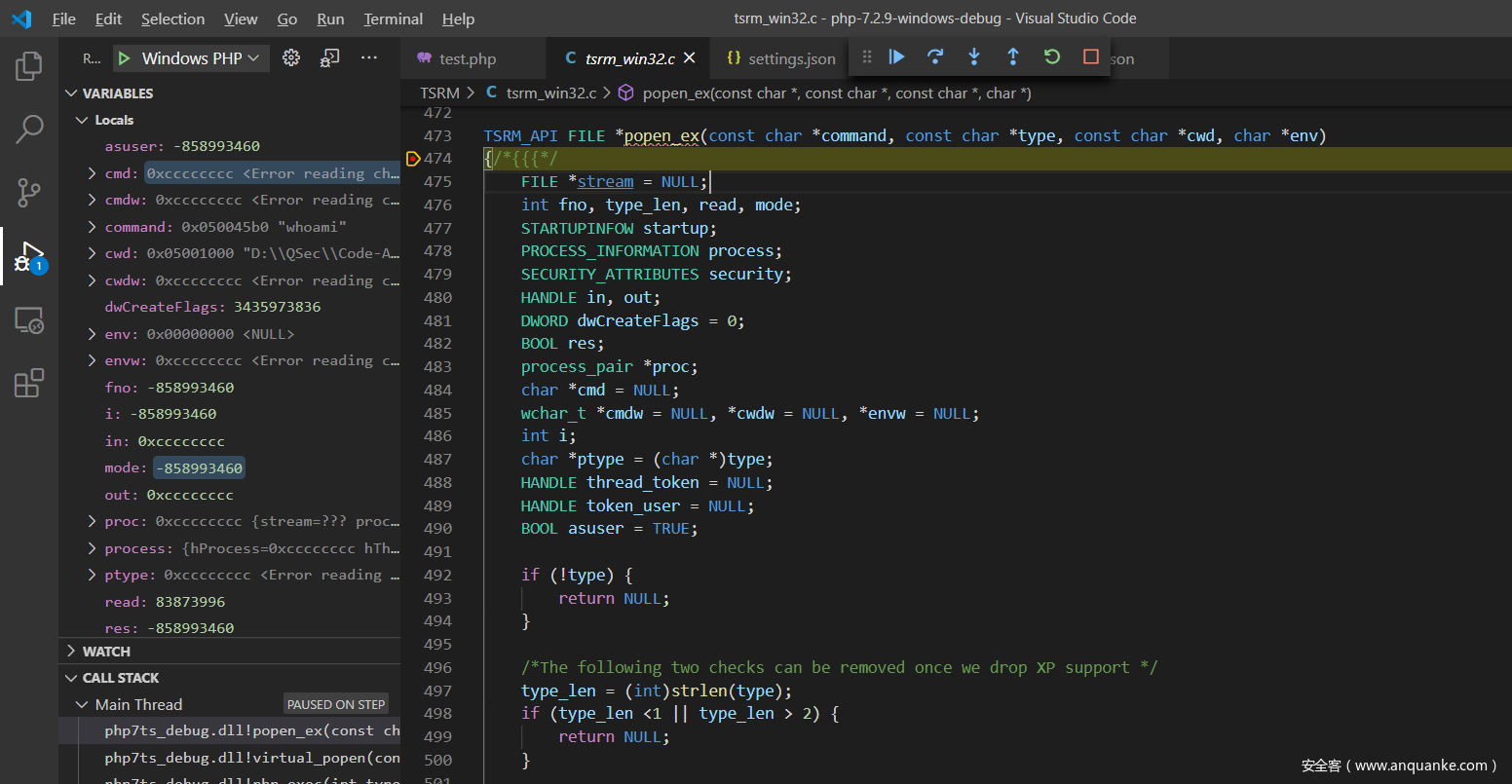
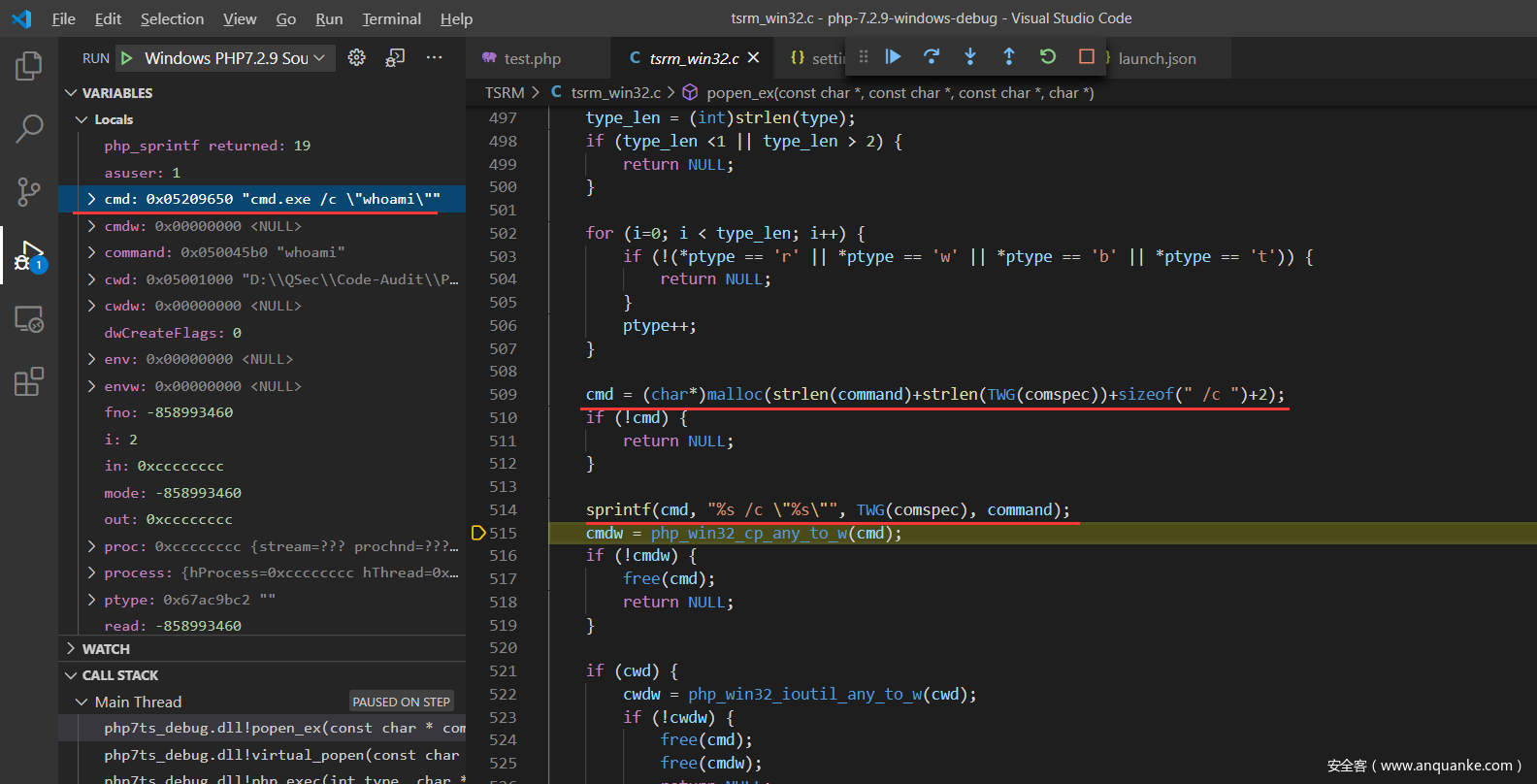
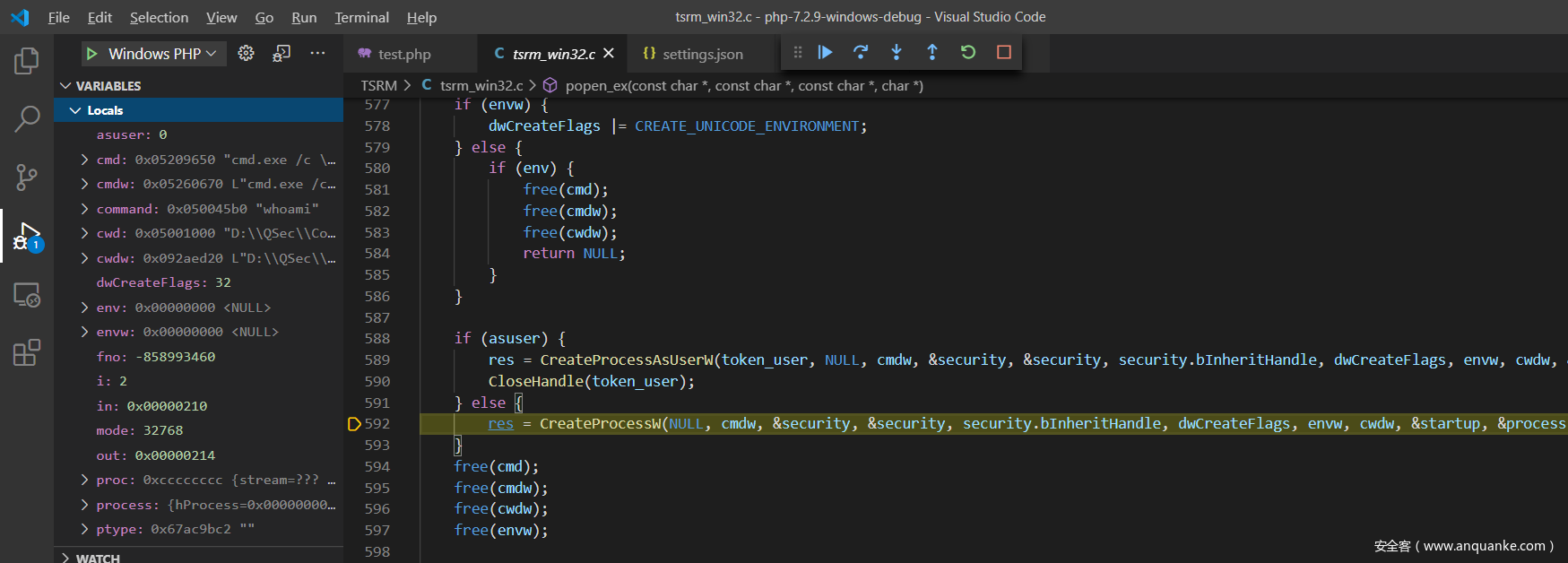
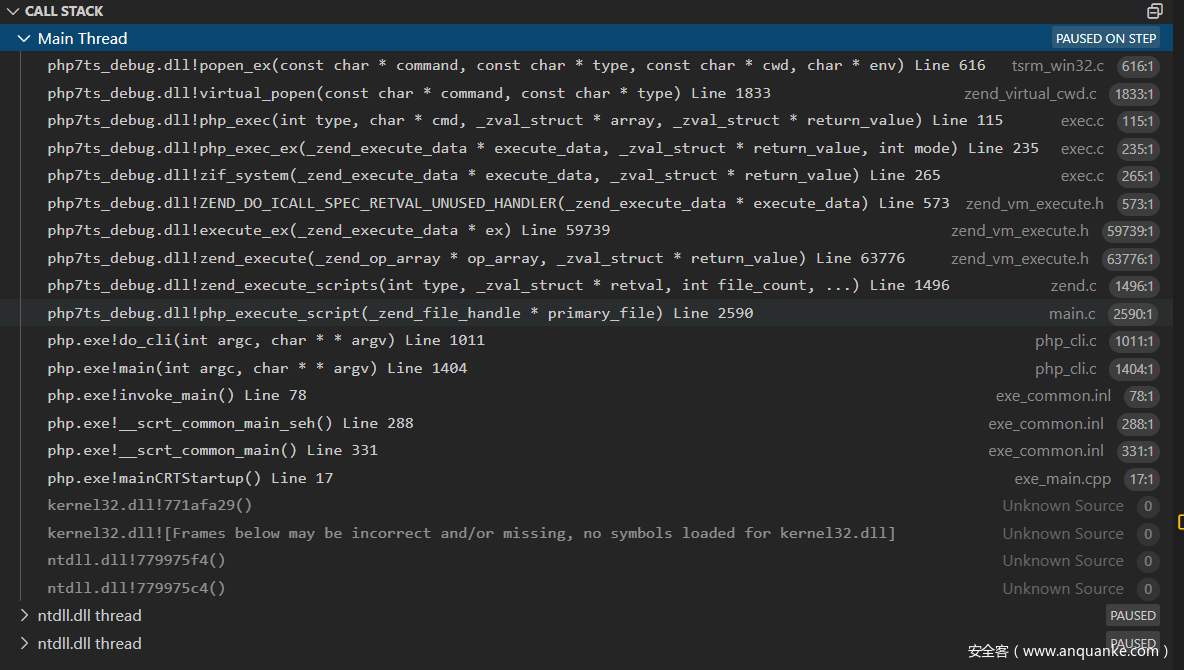
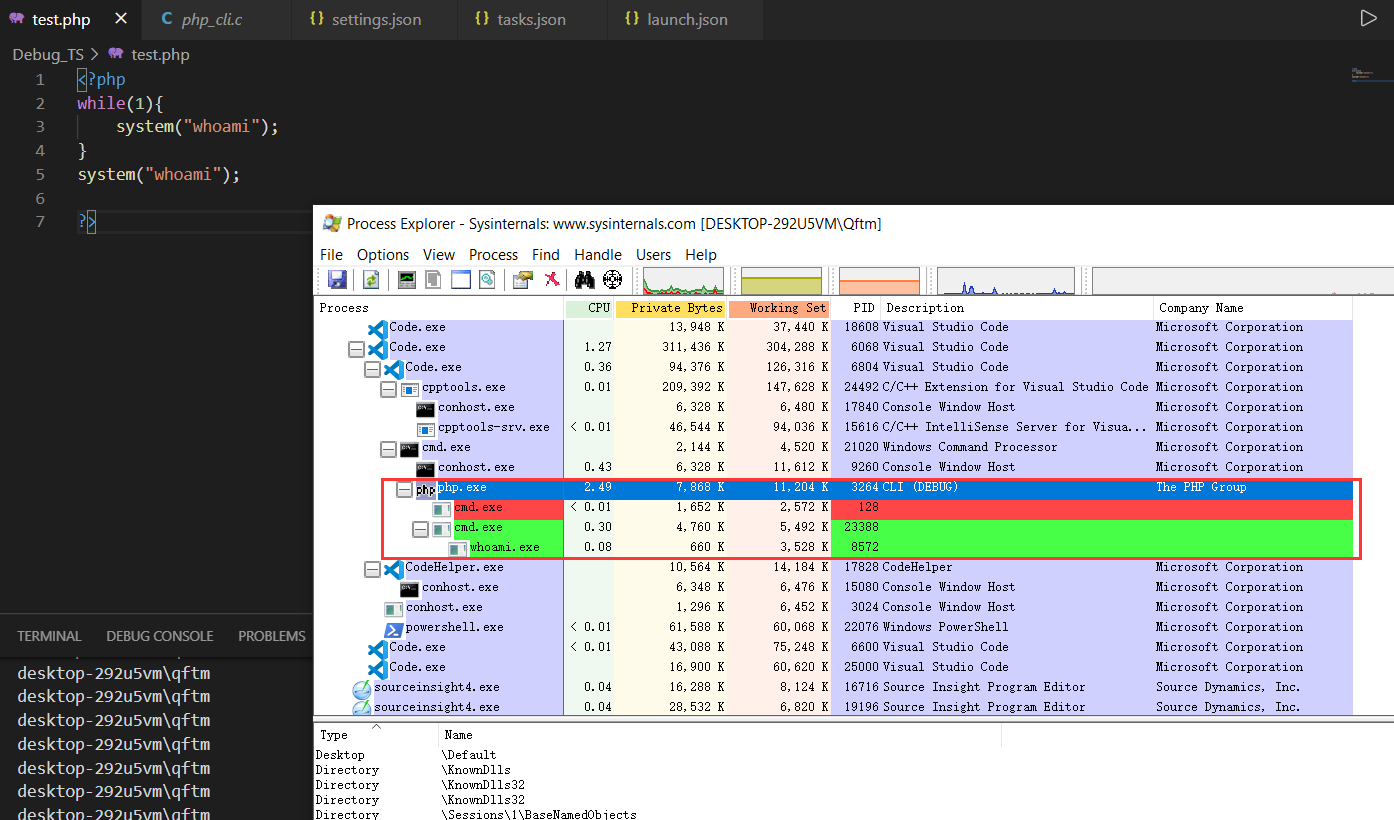







发表评论
您还未登录,请先登录。
登录